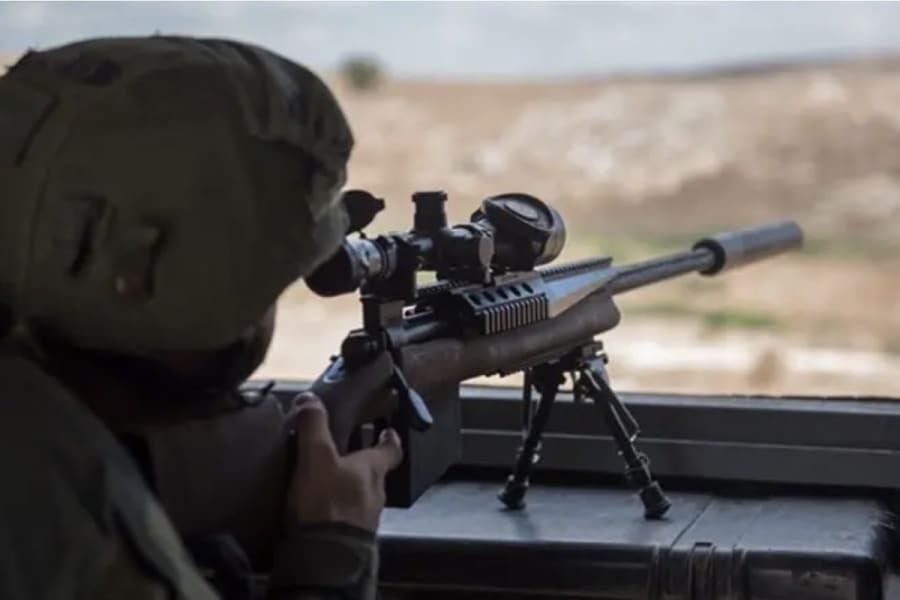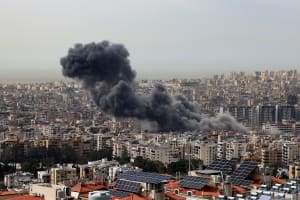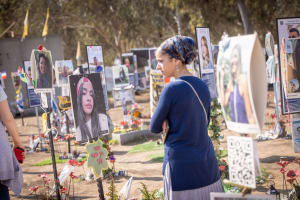WATCH: IDF sniper shares experience of fighting Hamas terrorists in Gaza
Inside the mind of an IDF sniper

Snipers in the military are often seen as mysterious figures – some regard them as 'heroes' defending their homeland with unmatched precision, while others view them as symbols of the moral dilemmas of war.
In an exclusive interview, IDF Staff Sergeant 'K,' an American Jew who enlisted in the Israeli Defense Forces (IDF) after making aliyah, shares his personal experiences and impressions from the Gaza battlefield.
K., speaking candidly with ALL ISRAEL NEWS correspondent Oriel Moran, talks about the life and challenges of a sniper, and the terrorists behind the snipers’ scopes.
“I wanted to be a sniper because I thought the role was very important, very hard, and it took a dedicated type of person with a certain mental state.” From childhood, K. explains, he envisioned himself as an IDF sniper, feeling confident that he had the mental resilience to handle the job’s responsibilities.
After eight months of basic and advanced training, he joined the sniper course at Mitkan Adam military base, where he honed his skills. The specialized training covered everything from weapon mechanics to mathematics and physics – skills essential for long-range shooting.
During that time, he built on his existing patience, adaptability, and other personal skills needed to deal with harsh terrains and unexpected situations. “You can’t take someone for a week and get them to change the way he thinks. That’s his decision,” K. said, highlighting the mental fortitude needed to accomplish the mission.
Nevertheless, there is no avoiding the horrors of war. As K. reflects on a harrowing experience, he recalls an incident involving a child’s booby-trapped body being used to lure unsuspecting soldiers. “At that point, my head just wanted to kill the dude,” he admits. K. explains that this event played a role in desensitizing him to the enemy, saying, “There was no emotion or any feeling to my enemy whatsoever.”
K. describes another incident that left him feeling detached and reflective. While guarding an intersection in Gaza, he noticed a man defying clearly communicated orders to stay away. “I had my scope lined up on him, switched my safety off, and my finger on the trigger,” he describes.
The man was startled by a burst of fire from a tank, giving K. a split second to adjust his aim and fire, hitting his hip. At that moment, K. prayed not for forgiveness but for understanding. Quoting General Patton, he states, “The object of war is not to die for your country; it’s to make the other guy die for his.”
Even in the midst of war, K. found himself concerned about the impact of his role. During an operation where he encountered a man acting erratically and threatening to throw a gas can, he consulted his supervisor and decided to neutralize the threat.
Immediately afterward, he saw the man’s family running to him, mourning his death. “I thought to myself, did I just [create] a terrorist in 15 years?” he wondered, contemplating the cycle of violence. Yet even incidents like these did not deter him from his mission. “You have to defend your people,” he states resolutely.
K. describes the physical and emotional toll of life as an IDF sniper. “You sleep on whatever you can,” he explains, sharing about conditions that challenge even the most prepared soldiers: few showers, basic food, and makeshift shelters in inclement weather. Still, the bonds forged with his fellow soldiers got him through: “It’s like brothers. Even people you hate, you take a bullet for,” he says.
For even the most veteran snipers, transitioning back to civilian life is challenging. “I’m a trained killer. That’s what I am,” he states bluntly. The contrasts between life in an active war zone and civilian life have left him feeling disconnected. Still, K. acknowledges the ongoing effects of his service but is grateful for the new perspectives it brought.
“You realize a lot of the stuff that you would worry about or stress yourself out over, you don’t anymore,” he says, remarking that he has an added appreciation for the simple pleasures in life.
K. remains unapologetic about his role in the war, insisting, “The IDF is the most moral army in the world.” He refutes misinformation and accusations of genocide while praising the IDF’s statistically proven low civilian casualty rate and strict adherence to international laws. “If we really wanted to commit genocide, this war would have been over on the 8th of October,” he argues.
K. maintains his actions should not be glorified. “It’s something to be proud of, not praised,” he remarks, beseeching others to recognize the solemnity of his role without idolizing his actions.
As the interview concludes, K. reminds us of his enduring commitment to his people: “Have respect for the people that are going through it.”
IDF Staff Sergeant K.'s story reflects resilience, certainty, and the challenges of humanity. It offers listeners a glimpse into the complexities of the Hamas war against Israel through the eyes of a sniper tasked with defending his country and people.

The All Israel News Staff is a team of journalists in Israel.













